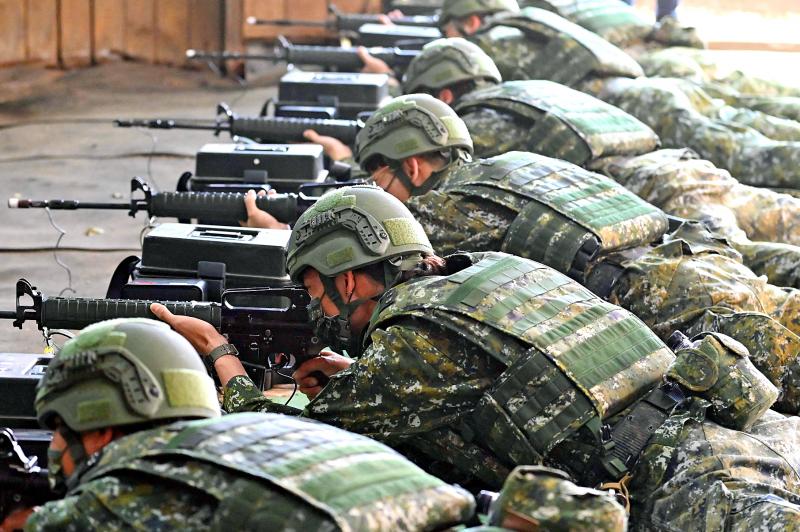Proposals to amend security and defense laws are aimed at better preparing the nation’s private security guards for civil defense in wartime, Democratic Progressive Party (DPP) Legislator Chang Liao Wan-chien (張廖萬堅) said yesterday.
Chang Liao and other DPP legislators have proposed amendments to the Private Security Service Act (保全業法) and the All-out Defense Mobilization Readiness Act (全民防衛動員準備法) to allow the Ministry of National Defense to train private security firms in civil defense so that they can be incorporated into the nation’s civil defense system in wartime.
“Security personnel are involved in protecting various aspects of life in Taiwan, such as residential buildings, commercial offices, transit stations, construction sites, factories, hospitals and power plants,” Chang Liao said. “This group of frontline staff is familiar with the public and the nation’s terrain, and could be an important force in defending the country.”

Photo: Sam Yeh, AFP
One of the proposals would amend Article 15 of the All-out Defense Mobilization Readiness Act, which states that during wartime, authorities should organize “professional citizens, civil defense forces, volunteer firefighters and rescue personnel, as well as ... school youths, retired veterans” and others into defense plans. The amendment would add security guards to that list.
The proposals would benefit defense efforts by offloading some tasks traditionally performed by the military and police to the private security industry, Institute for National Defense and Security Research postdoctoral researcher Hsu Chih-hsiang (許智翔) said.
Efficient deployment of labor is important to a nation like Taiwan, which has “relatively few troops,” he said, adding that civil defense forces could respond effectively to disaster scenarios.
Community security would be important in helping people take refuge, as they would know the location of safe spaces, civilian resources and how many people could be accommodated, he said.
“For example, look at the war in Ukraine. When residential and commercial buildings came under fire, building security knew better than anyone how to evacuate those buildings,” he said. “When whole communities need to evacuate or take refuge, it is community authorities who best know what refuge spaces there are, and what resources the community has.”
Security Industries Association president Chang Ta-chang (張達錩) said he hoped the law could be amended as soon as possible so that the military could start training security guards.

CHANGING LANDSCAPE: Many of the part-time programs for educators were no longer needed, as many teachers obtain a graduate degree before joining the workforce, experts said Taiwanese universities this year canceled 86 programs, Ministry of Education data showed, with educators attributing the closures to the nation’s low birthrate as well as shifting trends. Fifty-three of the shuttered programs were part-time postgraduate degree programs, about 62 percent of the total, the most in the past five years, the data showed. National Taiwan Normal University (NTNU) discontinued the most part-time master’s programs, at 16: chemistry, life science, earth science, physics, fine arts, music, special education, health promotion and health education, educational psychology and counseling, education, design, Chinese as a second language, library and information sciences, mechatronics engineering, history, physical education

The Chinese military has boosted its capability to fight at a high tempo using the element of surprise and new technology, the Ministry of National Defense said in the Quadrennial Defense Review (QDR) published on Monday last week. The ministry highlighted Chinese People’s Liberation Army (PLA) developments showing significant changes in Beijing’s strategy for war on Taiwan. The PLA has made significant headway in building capabilities for all-weather, multi-domain intelligence, surveillance, operational control and a joint air-sea blockade against Taiwan’s lines of communication, it said. The PLA has also improved its capabilities in direct amphibious assault operations aimed at seizing strategically important beaches,

The High Prosecutors’ Office yesterday withdrew an appeal against the acquittal of a former bank manager 22 years after his death, marking Taiwan’s first instance of prosecutors rendering posthumous justice to a wrongfully convicted defendant. Chu Ching-en (諸慶恩) — formerly a manager at the Taipei branch of BNP Paribas — was in 1999 accused by Weng Mao-chung (翁茂鍾), then-president of Chia Her Industrial Co, of forging a request for a fixed deposit of US$10 million by I-Hwa Industrial Co, a subsidiary of Chia Her, which was used as collateral. Chu was ruled not guilty in the first trial, but was found guilty

DEADLOCK: As the commission is unable to forum a quorum to review license renewal applications, the channel operators are not at fault and can air past their license date The National Communications Commission (NCC) yesterday said that the Public Television Service (PTS) and 36 other television and radio broadcasters could continue airing, despite the commission’s inability to meet a quorum to review their license renewal applications. The licenses of PTS and the other channels are set to expire between this month and June. The National Communications Commission Organization Act (國家通訊傳播委員會組織法) stipulates that the commission must meet the mandated quorum of four to hold a valid meeting. The seven-member commission currently has only three commissioners. “We have informed the channel operators of the progress we have made in reviewing their license renewal applications, and